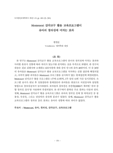

-
 * 본 문서는 배포용으로 복사 및 편집이 불가합니다.
* 본 문서는 배포용으로 복사 및 편집이 불가합니다.
미리보기
서지정보
· 발행기관 : 인지발달중재학회
· 수록지 정보 : 인지발달중재학회지 / 3권 / 1호
· 저자명 : 황정순
목차
Ⅰ. 서론
Ⅱ. 연구방법
Ⅲ. 연구결과
Ⅳ. 논의 및 결론초록
본 연구는 Montessori 감각교구 활용 교육프로그램이 유아의 창의성에 미치는 효과와
이러한 효과가 성별에 따라 차이가 있는가를 분석하는 것을 목적으로 하였다. 본 연구의
대상은 경남 김해시에 소재하는 H유치원에 재원 중인 만 5세 유아 40명이다. 이 중 20명
의 유아들은 Montessori 감각교구 활용 교육프로그램을 처치하는 실험 집단에 배정되었
고, 나머지 20명 유아들은 Montessori 프로그램을 실시하지 않는 통제집단에 배정되었다.
Montessori 감각교구 활용 프로그램은 1주에 2-3회씩, 5주 동안 13회 기간 실시되었다. 프
로그램 실시가 끝난 후 실험집단과 통제집단의 유아들을 대상으로 서전검사와 동일한
방법으로 창의성검사가 실시되었다. 유아들의 창의성은 전경원(2000)이 제작한 ‘유아 종
합 창의성 검사’를 사용하여 측정되었다. 본 연구에서 밝혀진 주요 결과는 다음과 같다.
첫째, Montessori 감각교구 활용 교육프로그램은 유아의 창의성 전체 및 하위요인 중 융
통성, 독창성, 그리고 상상력의 증진에 효과가 있었다. 둘째, Montessori 감각교구 활용
교육프로그램의 창의성 증진 효과는 유아의 성별에 따라 차이가 없었다.영어초록
The purpose of this study was to examine the effect of the educational program using
Montessori sensory materials on the creativity of 5-year-old children who were attending at
kindergartens. Children were divided into the experimental and control groups each consisting
of 20 members. To measure those children's creativity, 'Korean Comprehensive Creativity Test
for Younger Children' which was developed by Jeon Gyeong Won(2000) was used. Findings
of the study can be summarized as follows. First, the education program using Montessori
sensory materials was effective to improve the creativity of younger children and its sub-areas
like flexibility, originality and imagination. Second, the effect of the education program using
Montessori sensory materials was significantly different between the two groups of children,
but not according to those children's gender.참고자료
· 없음태그
-
자료후기
-
자주묻는질문의 답변을 확인해 주세요

꼭 알아주세요
-
본 학술논문은 (주)학지사와 각 학회간에 저작권계약이 체결된 것으로 AgentSoft가 제공 하고 있습니다.
본 저작물을 불법적으로 이용시는 법적인 제재가 가해질 수 있습니다. -
해피캠퍼스는 구매자와 판매자 모두가 만족하는 서비스가 되도록 노력하고 있으며, 아래의 4가지 자료환불 조건을 꼭 확인해주시기 바랍니다.
파일오류 중복자료 저작권 없음 설명과 실제 내용 불일치 파일의 다운로드가 제대로 되지 않거나 파일형식에 맞는 프로그램으로 정상 작동하지 않는 경우 다른 자료와 70% 이상 내용이 일치하는 경우 (중복임을 확인할 수 있는 근거 필요함) 인터넷의 다른 사이트, 연구기관, 학교, 서적 등의 자료를 도용한 경우 자료의 설명과 실제 자료의 내용이 일치하지 않는 경우
“인지발달중재학회지”의 다른 논문도 확인해 보세요!
-
생명사랑에 대한 유아와 교사의 인식 분석 27 페이지
본 연구는 유아와 교사의 생명사랑에 대한 인식수준을 분석하고 나아가 생명사랑에 대한 유아와 교사의 인식수준 차를 분석하는 데 목적을 두고 있으며, 이를 위해 유아 285명과 교사 52명을 대상으로 설문조사를 실시하였다. 본 연구에서 나타난 주요 결과 는 다음과 같다. 첫째, 생명사랑에 대한 유아의 인식수준은 사랑의 요소 간에 차이가 있 으며, 생명에.. -
예술고와 전문계고 학생들의 학습동기와 일상적 창의성과의 관계 연구 15 페이지
본 연구는 고등학생들의 학습동기와 일상적 창의성과의 관계를 알아보기 위해서 광주 광역시 A, B, C 고등학교 305명을 대상으로 빈도분석, t검정, 상관분석, 회귀분석을 실시 하였다. 결론은 다음과 같다. 첫째, 전문계고 학생들은 학교 밖에서 학습결과를 계속해서 이어가려는 경향이 있다. 예술고 학생들은 다양한 경험과 자유를 추구하려는 경향, 새로운.. -
독서교육 활성화 시범학교 경험에 따른 중학생의 독서활동 분석 17 페이지
본 연구는 독서교육 활성화 시범학교 학생과 일반학교 학생들의 독서활동을 분석하는 데 목적이 있다. 본 연구의 대상은 부산광역시에 소재하고 있는 현재 독서교육 활성화 시범학교인 J중학교 남녀학생 267명, 독서교육 활성화시범 경험이 전혀 없는 D중학교 남녀학생 268명, 그리고 1년 전 독서교육 연구시범을 경험한 A중학교 남녀학생 175명, 총 710.. -
유아의 정서지능과 어머니의 양육행동 및 교사-유아 관계가 유아의 친사회적 행동에 미치는 영향 25 페이지
본 연구는 만 3, 4, 5세 유아의 친사회적 행동에 대한 성과 연령에 따른 차이를 살펴보 고 친사회적 행동에 대한 유아의 정서지능, 어머니의 양육행동, 교사-유아 관계의 관계 및 이들 관련 변인들의 상대적인 영향을 성에 따라 파악하는 데 목적을 두고 있다. 본 연구의 대상은 부산시에 소재하고 있는 어린이집 6개원에 재원 중인 만 3, 4, 5세 유아.. -
MeFOT을 활용한 그림책의 페이지브레이크 활동이 유아의 창의성에 미치는 효과 21 페이지
본 연구는 MeFOT을 활용한 그림책의 페이지브레이크 활동이 유아의 창의성에 미치 는 효과가 어떠한지, 나아가 그 효과가 성별에 따라 달라지는지를 분석하는 데 목적을 두고, 유아 45명을 대상으로 실험하였다. 유아의 창의성을 측정하기 위해서 Torrance(1962) 의 창의적 사고력 검사(Torrance Test Creative Thinking: T..
문서 초안을 생성해주는 EasyAI


